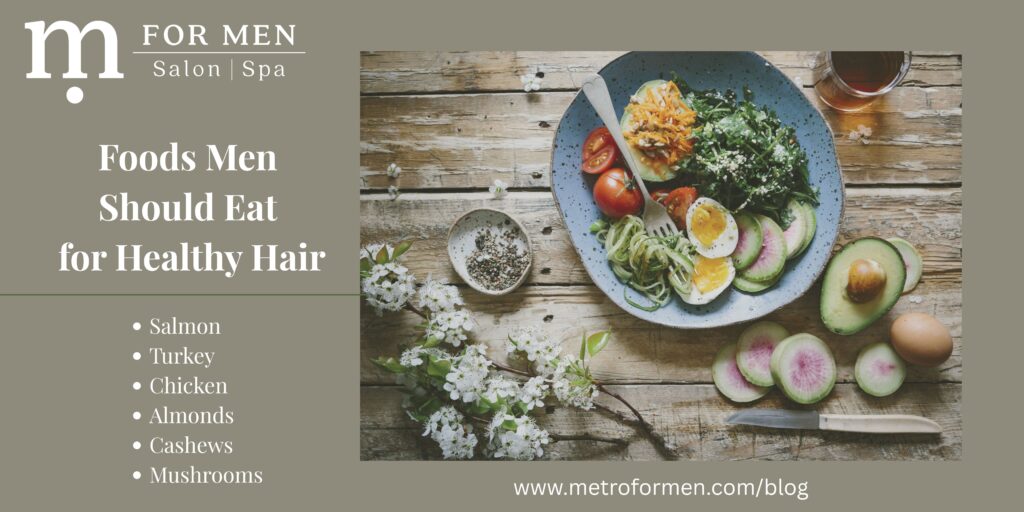
Healthy, vibrant hair isn’t just about the right shampoo—it starts from within. The foods we eat are crucial in strengthening hair, preventing thinning, and even maintaining its natural color. Incorporating nutrient-rich foods into their diet is key if men want shinier, stronger, and more resilient hair. Salmon, packed with omega-3 fatty acids, enhances shine, while protein-rich chicken helps combat hair loss. Turkey provides essential nutrients to prevent thinning, and almonds offer potent antioxidants that protect the scalp from burns. Men struggling with dandruff should eat cashews, thanks to their zinc-rich content. Eat shiitake mushrooms to keep men’s hair from losing its natural pigment. They are rich in copper and are a must-have. This blog post will discuss how these superfoods nourish men’s hair from the inside out.
Hair Super Foods
Eating the right superfoods can be a game-changer for men looking to maintain strong, healthy hair. Hair health depends on a balance of essential nutrients. Including proteins, healthy fats, vitamins, and minerals, all of which superfoods provide in abundance. For instance, omega-3 fatty acids found in salmon help nourish hair follicles, adding shine and preventing dryness. Protein-rich foods like chicken and turkey support keratin production, strengthening hair strands. These proteins also reduce hair loss! Nuts like almonds and cashews supply key minerals like zinc and vitamin E. These vitamins protect the scalp to prevent dandruff and reduce inflammation. Shiitake mushrooms are an excellent source of copper. A vital mineral that helps maintain hair pigmentation and slows down premature graying.
Beyond hair health, these nutrient-dense foods contribute to overall well-being by:
- Boosting circulation
- Reducing oxidative stress
- Supporting hormonal balance
All of which are crucial for maintaining thick, vibrant hair. Incorporating a variety of superfoods into a diet improves hair health and enhances skin, mood, and energy levels. Making them a must-have for a well-rounded, healthy lifestyle.
Add Some Shine With Salmon

Salmon is not only a powerhouse of nutrition for overall health, but it also plays a crucial role in maintaining vibrant, shiny hair. If hair has lost its natural luster and appears dull, it could be a sign of a deficiency in healthy fats. Omega-3 fatty acids, which are abundantly found in salmon, are essential for nourishing the scalp and hair follicles. These healthy fats help produce natural oils that coat the hair strands, providing hydration and a smooth, glossy finish. Regularly incorporating salmon into a diet can restore shine, making hair look healthier and more appealing. The added moisture also prevents dryness and brittleness, ensuring that your locks remain soft and touchable. So irresistible that people may find themselves tempted to run their fingers through it.
Prevent Hair Thinning With Turkey
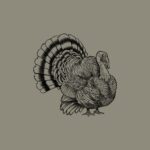
Protein, protein, protein—it’s essential for overall health and a fundamental building block for strong, healthy hair. Hair is primarily made of keratin, a type of protein. Without an adequate supply of keratin, hair can become weak, brittle, and prone to excessive shedding. On average, people naturally lose about 50 to 100 strands of hair per day. However, if a diet lacks sufficient protein, that number can increase, leading to noticeable thinning. Everyday activities like brushing, styling, or even running your fingers through your hair can contribute to more significant hair loss when protein intake is low. One of the best sources of high-quality protein is turkey. Turkey helps strengthen hair strands and supports the natural hair renewal process. Incorporating other nutrient-rich sources like chicken, eggs, and fish into a diet to boost protein intake also helps. These foods provide the essential amino acids to keep hair resilient, thick, and less susceptible to breakage.
Prevent Hair Loss With Chicken
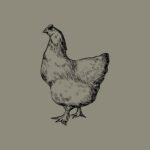
Iron plays a crucial role in maintaining healthy hair. It helps deliver oxygen and essential nutrients to the hair follicles. When iron levels are too low, it can lead to a condition called anemia. Anemia disrupts the hair growth cycle and contributes to excessive shedding. This happens because iron is necessary for producing hemoglobin, a protein in red blood cells that carries oxygen to the scalp and hair follicles. Without enough oxygen and nutrients, hair becomes weak, brittle, and more prone to falling out. To keep iron levels balanced, consuming iron-rich foods like chicken and red meat is highly beneficial. Chicken and red meat provide heme iron, which is easily absorbed by the body. However, iron can also be obtained from leafy greens like kale and spinach for those who follow a plant-based diet. While non-heme iron from plants is not absorbed as efficiently, pairing it with vitamin C-rich foods, such as citrus fruits or bell peppers, can enhance absorption and help support healthy hair growth.
Protect Scalp Burns With Almonds
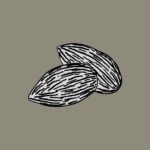
A day at the beach is always enjoyable, but prolonged sun exposure can be harsh on the body. Especially the scalp. While we often hear about the importance of sunscreen for our skin, many people overlook the need to protect their scalp from sunburn. Scalp burns are painful and can lead to dryness, peeling, and long-term damage to hair follicles. One way to strengthen the scalp’s defense against harmful UV rays is by incorporating more almonds into a diet. Almonds are packed with vitamin E, a powerful antioxidant that helps absorb and neutralize the energy from UV rays before they can cause significant harm. This essential nutrient protects skin cells from sun damage and aids in repairing previous damage. Promoting a healthier scalp and more substantial hair growth. So, the next time you plan a beach trip, don’t just pack sunscreen—boost your scalp’s natural protection by snacking on almonds.
Get Rid Of Dandruff With Cashews
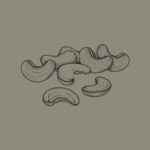
Many men constantly struggle with a dry, flaky scalp, even after trying countless dandruff shampoos and hair products. A specific food in a diet might be the missing piece of the puzzle if dandruff remains a persistent issue. One key nutrient for a healthy scalp is zinc. Zinc plays a vital role in skin cell regeneration and oil production. A zinc deficiency can lead to excessive dryness, flaking, and worsening dandruff. Luckily, cashews are an excellent source of this essential mineral and can help restore the balance the body needs. Not a fan of cashews? No problem! Try boosting zinc intake with foods like yogurt, pumpkin seeds, and other zinc-rich options. By incorporating these zinc-rich foods into a diet, men can nourish their scalp from the inside out. Finally saying goodbye to relentless dandruff and dry scalp issues.
Prevent Premature Graying With Shiitake Mushrooms
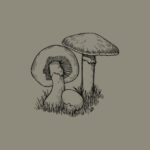
We all reach that stage in life where gray strands are beginning to appear. While there is absolutely nothing wrong with embracing silver locks, it is natural to want to maintain the hair’s original color for as long as possible. If hair is graying faster than expected, a copper deficiency might be to blame. This essential mineral plays a key role in melanin production, which gives hair its pigment. Unfortunately, many diets lack sufficient copper, making it harder to slow down premature graying. One of the best natural sources of copper is shiitake mushrooms. Just half a cup of cooked shiitakes can provide the recommended daily intake of copper. While many men focus on nutrition primarily for weight management, the benefits of whole, nutrient-rich foods extend far beyond the scale. A balanced diet can enhance mood, strengthen hair, improve skin health, and even fortify nails.
How Hairstylists Can Spot Deficiencies
A hairstylist’s role extends far beyond cutting, coloring, and styling hair. They are often the first to notice signs of underlying health issues when observing the hair and scalp. Notably, vitamin and mineral deficiencies which can impact hair quality. Men, in particular, may not always be aware of how their diet and lifestyle affect their hair health. Making a hairstylist’s insight invaluable. By recognizing the signs of nutrient deficiencies, making tailored suggestions, and recommending proper hair care, hairstylists can play a crucial role in helping men achieve and maintain strong, healthy hair.
Identifying Deficiencies Through Hair Quality
Hair health reflects overall well-being. Deficiencies in key nutrients often manifest in noticeable ways. As a hairstylist, paying attention to changes in texture, scalp condition, and hair growth patterns can provide insight into a client’s nutritional status.
1. Dry, Brittle Hair
Dry, brittle hair can equate to a lack of Omega-3 Fatty Acids and Vitamin A. If a client’s hair feels excessively dry, brittle, and lacking luster, they may not consume enough omega-3 fatty acids or vitamin A. These nutrients help maintain moisture and promote a healthy scalp. Foods such as salmon, walnuts, flaxseeds, and leafy greens can help replenish these deficiencies.
2. Thinning Hair
Thinning hair can mean protein, iron, and zinc deficiencies. Hair thinning or excessive shedding is often linked to a lack of protein, iron, or zinc. Protein is essential for hair structure, while iron supports hair follicle oxygenation, and zinc aids in tissue repair. If a client is experiencing noticeable hair thinning, they may need more lean meats, eggs, lentils, and pumpkin seeds in their diet.
3. Dandruff and Scalp Irritation
Dandruff and scalp irritation can indicate a deficiency of Vitamin B, zinc, and essential fatty acids. A flaky or irritated scalp could mean a man needs more foods rich in B vitamins, zinc, or essential fatty acids. These nutrients help maintain skin health and regulate oil production. Suggesting foods like eggs, whole grains, almonds, and avocados can help clients improve scalp conditions naturally.
4. Premature Graying
Premature graying may seem natural, but it could also be due to a copper deficiency. Copper plays a key role in melanin production, which gives hair its natural pigment. A prematurely graying client may lack copper-rich foods such as shiitake mushrooms, nuts, seeds, and shellfish.
5. Slow Growth
Slow hair growth happens; however, checking for a deficiency in biotin and vitamin D may not be a bad idea. Biotin is crucial for keratin production, and vitamin D supports follicle health. Clients struggling with slow hair growth may benefit from eating more eggs, nuts, and dairy products. As well as, spending time outdoors to boost vitamin D levels.
Hairstylists Make Suggestions for Healthier Hair
Once hairstylists recognize signs of nutrient deficiencies, they can offer practical advice to help clients improve their hair health. While hairstylists are not medical professionals, they can encourage healthier habits that promote stronger, shinier, and more resilient hair.
Educating Clients on Nutrition
To address hair concerns, hairstylists can gently suggest incorporating specific nutrient-rich foods into their clients’ diets. By explaining how foods like salmon, almonds, and leafy greens contribute to better hair health, clients may be more motivated to make dietary changes.
Recommending Supplements
While a balanced diet is the best way to obtain essential nutrients, some clients may benefit from hair supplements. Biotin, collagen, and omega-3 supplements can support hair strength and growth. Hairstylists can recommend speaking to a healthcare provider before starting any supplements.
Promoting Scalp Care Routines
A healthy scalp is the foundation of healthy hair. Gentle scalp massages, deep conditioning treatments, and sulfate-free shampoos can help improve scalp circulation and hydration. Products containing tea tree oil, peppermint, and aloe vera can also help maintain scalp health.
Encouraging Proper Maintenance Habits
Simple changes in hair care routines can make a significant difference. Advising clients to avoid excessive heat styling, harsh chemical treatments, and overwashing can help protect hair from further damage. Encouraging protective hairstyles can also prevent breakage and hair loss.
Hairstylists Help Men Maintain Healthy Hair
Men often require practical, low-maintenance hair care advice. A hairstylist’s guidance can help them establish and stick to a routine that promotes hair health.
Personalized Care Plans
Every client has unique hair needs. Hairstylists can create personalized hair care routines based on a client’s hair type, scalp condition, and lifestyle. Tailored advice can significantly impact whether to recommend moisturizing shampoos for dry hair or volumizing products for thinning hair.
Professional Treatments
Offering salon treatments such as deep conditioning masks, scalp exfoliation, or keratin treatments can help strengthen and nourish hair. Regular trims can also prevent split ends and keep hair looking healthier.
Stress Management and Lifestyle Tips
Stress and poor lifestyle choices can contribute to hair loss and poor hair quality. Encouraging relaxation techniques, regular exercise, and adequate sleep can help clients maintain overall wellness, which is reflected in their hair health.
Regular Check-Ins and Progress Tracking
Hairstylists can monitor clients’ hair changes over time and adjust recommendations accordingly. By tracking progress and offering continued support, clients are more likely to stay consistent with their hair care routine.
More than “Just” a Stylist
Hairstylists have a unique opportunity to help men achieve and maintain healthy hair by spotting vitamin and mineral deficiencies. Offering practical suggestions and guiding them toward better hair care practices. By focusing on holistic hair health—nutrition, scalp care, and proper maintenance—hairstylists can empower their clients to take better care of their hair from the inside out. With the right knowledge and recommendations, hairstylists can impact their clients’ confidence and overall well-being.
